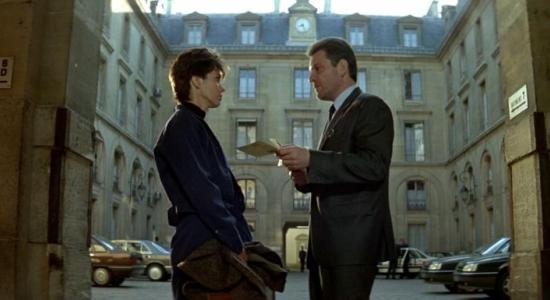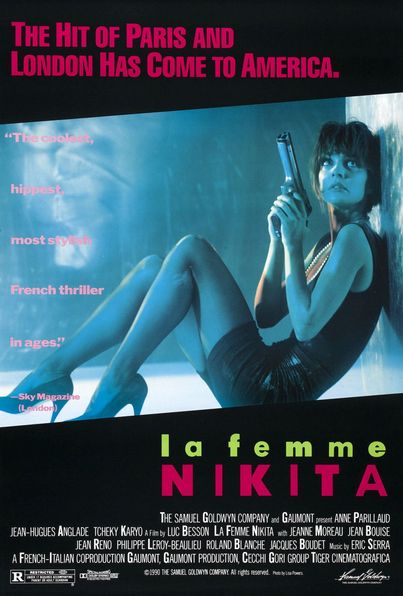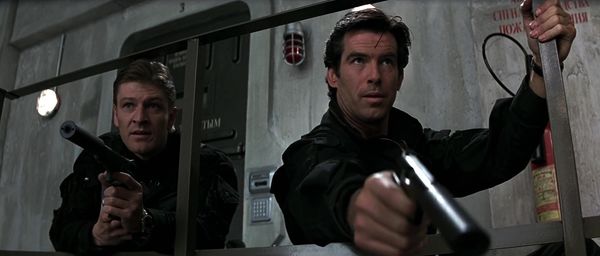La Femme Nikita (1990)

La Femme Nikita is a 1990 French action thriller directed by Luc Besson that has become a seminal film in the genre, influencing numerous remakes and adaptations across various media. With its blend of intense action, psychological depth, and a strong female lead, the film redefined the spy thriller and introduced audiences to a complex character grappling with her identity and morality.
The story follows Nikita, played by Anne Parillaud, a young woman who is sentenced to life in prison for committing a violent crime. However, her life takes a dramatic turn when she is recruited by a secret government organization instead of serving her sentence. Trained to become an assassin, Nikita is thrust into a world of espionage and danger, where she must navigate the challenges of her new identity while grappling with the remnants of her past.

One of the film’s most compelling aspects is its exploration of transformation. Nikita’s journey from a troubled young woman to a skilled operative raises questions about personal agency and the impact of one’s environment on identity. As she undergoes rigorous training, the film delves into the psychological ramifications of her new life. Besson crafts a narrative that is both thrilling and introspective, allowing viewers to connect with Nikita’s struggles as she attempts to reconcile her past with her new role.
Anne Parillaud delivers a powerful performance, capturing the vulnerability and strength of her character. Nikita is portrayed as a multifaceted individual, oscillating between moments of fierce determination and deep emotional conflict. Her relationships, particularly with her handler, Bob (Tchéky Karyo), and her love interest, Marco (Jean-Hugues Anglade), add layers to her character, highlighting her desire for connection amidst the isolation of her role as an assassin.

The film’s cinematography, helmed by Thierry Arbogast, is visually striking, with carefully composed shots that enhance the mood and tone of the narrative. Besson employs a rich color palette and dynamic camera movements to create a sense of urgency and tension. The use of Paris as a backdrop adds an element of romance and sophistication, contrasting with the darker themes of the story.
Action sequences in La Femme Nikita are expertly choreographed, blending realism with stylistic flair. Besson’s direction emphasizes the physicality of the characters while maintaining a sense of emotional weight. The film balances intense action with quieter, reflective moments, allowing for a deeper exploration of Nikita’s internal struggles. The iconic scene in which Nikita must navigate a high-stakes assassination showcases both her training and her emotional turmoil, encapsulating the film’s dual focus on action and character development.

The score, composed by Éric Serra, complements the film’s atmosphere, enhancing its emotional depth and tension. The music underscores key moments, adding to the overall impact of the narrative. Serra’s score has become synonymous with the film, contributing to its enduring legacy.
La Femme Nikita received critical acclaim upon its release, praised for its innovative approach to the action genre and its strong female lead. The film’s influence extended far beyond its initial reception, inspiring adaptations such as the American remake Point of No Return and the popular television series La Femme Nikita. It has become a touchstone in discussions about female representation in action cinema, showcasing a complex character who defies traditional gender roles.
In conclusion, La Femme Nikita is a groundbreaking film that combines action, drama, and psychological depth, presenting a compelling narrative about transformation and identity. Luc Besson’s direction, coupled with Anne Parillaud’s remarkable performance, creates a powerful and engaging experience. The film’s exploration of morality, loyalty, and the consequences of choice continues to resonate with audiences, solidifying its status as a classic in the action thriller genre. Whether experienced for the first time or revisited, La Femme Nikita remains a captivating exploration of the human condition set against a backdrop of espionage and intrigue.











